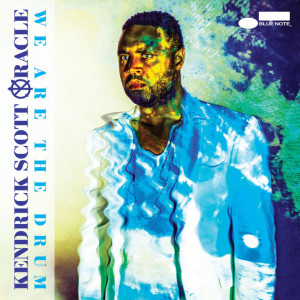 What do Flying Lotus, Kendrick Lamar, Sufjan Stevens, and Björk have in common? Besides their shared flare for artfully blending electronic and acoustic sounds, they are among the unintentionally curated set of non-jazz artists that jazz musicians, myself included, have almost universally anointed as worthy of seriously digging. And with its first three jazz albums, Kendrick Scott Oracle has dedicated a track on each to cover a song by one of these non-jazz artists.
What do Flying Lotus, Kendrick Lamar, Sufjan Stevens, and Björk have in common? Besides their shared flare for artfully blending electronic and acoustic sounds, they are among the unintentionally curated set of non-jazz artists that jazz musicians, myself included, have almost universally anointed as worthy of seriously digging. And with its first three jazz albums, Kendrick Scott Oracle has dedicated a track on each to cover a song by one of these non-jazz artists.
In the band’s debut album, The Source, Scott arranges a contemplative version of Björk’s 107 steps. John Ellis’ melancholy bass clarinet sets up an evocative modern jazz ballad. But the song selection is as much a reflection of Björk’s influence on Scott as it’s an homage to drummer Jeff “Tain” Watts, who also covered 107 Steps back in 2004.
With Oracle’s 2013 release Conviction, Scott brought the band back together after a seven-year hiatus. When I saw the track listing that contained a cover of Sufjan Steven’s Too Much, my excitement was palpable. I imagined Scott the perfect candidate to acoustically adapt the vast soundscape created by Stevens’ masterful blend of electronic revs and fuzz, given his uncanny ability to use the entirety of his drum set to create seemingly endless sonic variety. Instead, the band disregards Sufjan’s dramatic orchestration, strips the beat down to its most simplistic 7/4 meter, and brings in singer Alan Hampton. The result is vanilla at best, lacking the flare and spirit of the original version to which I had grown so attached. Perhaps too attached?
I was fully expecting to be disappointed by Oracle’s take on FlyLo’s Never Catch Me when their latest album We Are the Drum dropped three weeks ago. With the band’s history of covers it was a natural, almost too obvious choice, given the jazz-world popularity of both FlyLo and Kendrick Lamar, who is featured on the track off Lotus’ You’re Dead!.
Luckily my suspicion was well off the mark. Instead of bringing in a rapper or trying to mimic the original electro vibe, the band draws inspiration from the groove and plays to their strengths. This is apparent from the first note. Unlike the watered-down intro to their spin of Too Much, this cut begins with a drum solo. Drums are followed by the groove, artfully making the orchestrational choice to double a version of Kendrick’s flow on Ellis’ bass clarinet and Joe Sanders’ acoustic bass. It’s just plain bad (which, in jazz-speak, means really, really good).
The tune keeps building from there. Pianist Taylor Eigsti’s minimalist, driving chords that anchor the first half of the tune seamlessly morph into his virtuosic improvisation, a harmonically engaging display played with such rhythmic discipline that it reminds us why the piano is classified as a percussion instrument. Eigsti crescendos into a heartfelt and fiery transfer to a brief solo from John Ellis, who has laid down his bass clarinet in favor of the more soulful and passionate tenor sax. Scott’s propels the entire affair with his dynamic and inspired drumming, always punctuating each of the band’s musical sentences with an appropriately stimulating flurry.
Kendrick Scott is a musician first, drummer second. The composition-first attitude shines throughout We Are the Drum. The title is a statement about the groups shared timekeeping responsibility, which they all accept masterfully. Yet the essence of this band is a deep sense of groove combined with lush, powerful harmonies that inspire the listener to draw a long inhale.
This looming atmosphere has become Oracle’s signature voice, which is newly restored on this effort, their first for Blue Note. The sunny harmonic motion of Lizz Wright’s guest feature on This Song in Me is uplifting and folky enough to save the R&B tune from sounding like Blue Note’s attempt to mimic the success they created with label-mate Robert Glasper. Instead, We Are the Drum draws inspiration from many musical corners, jazz and non-jazz alike, to make a cohesive, sincere, and rich statement.
